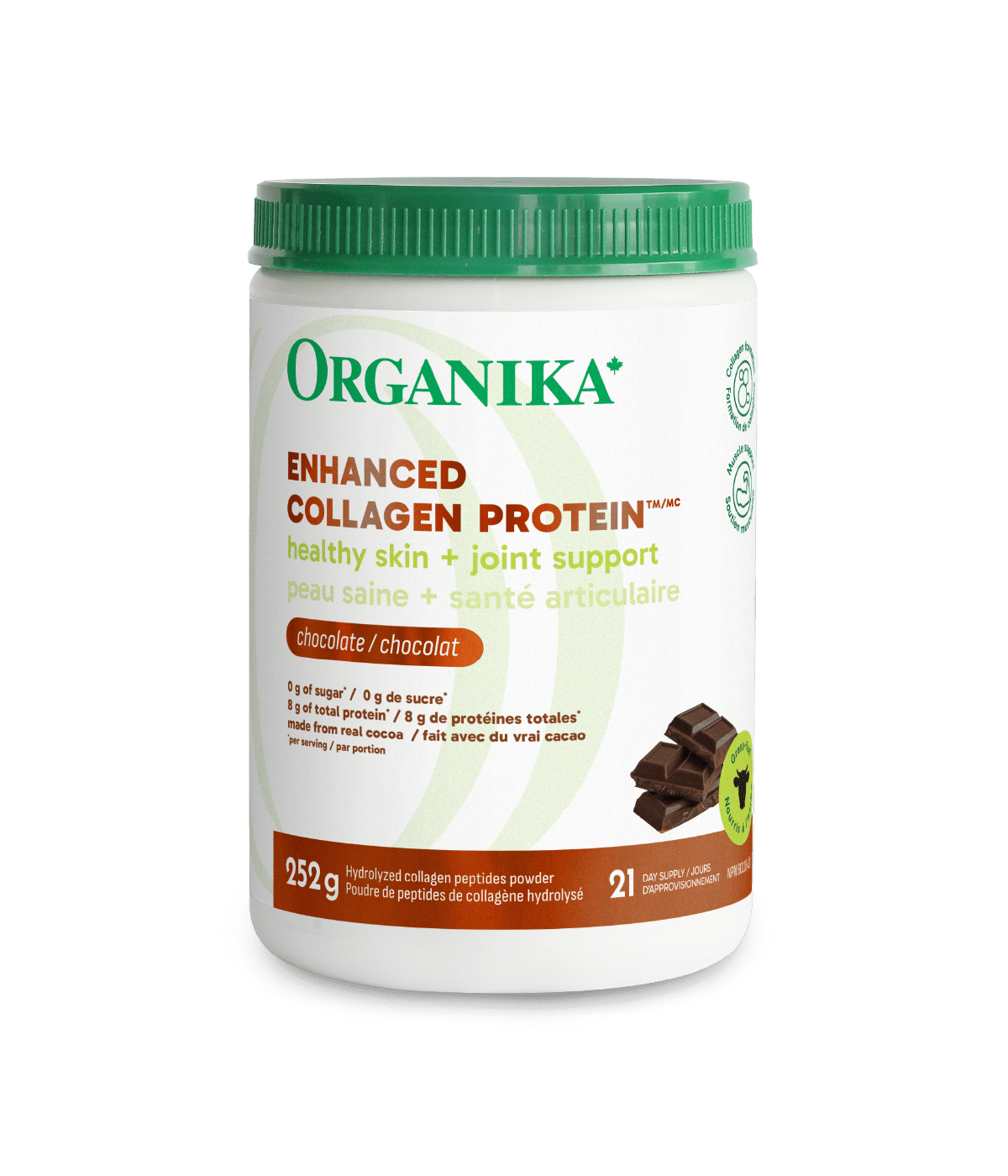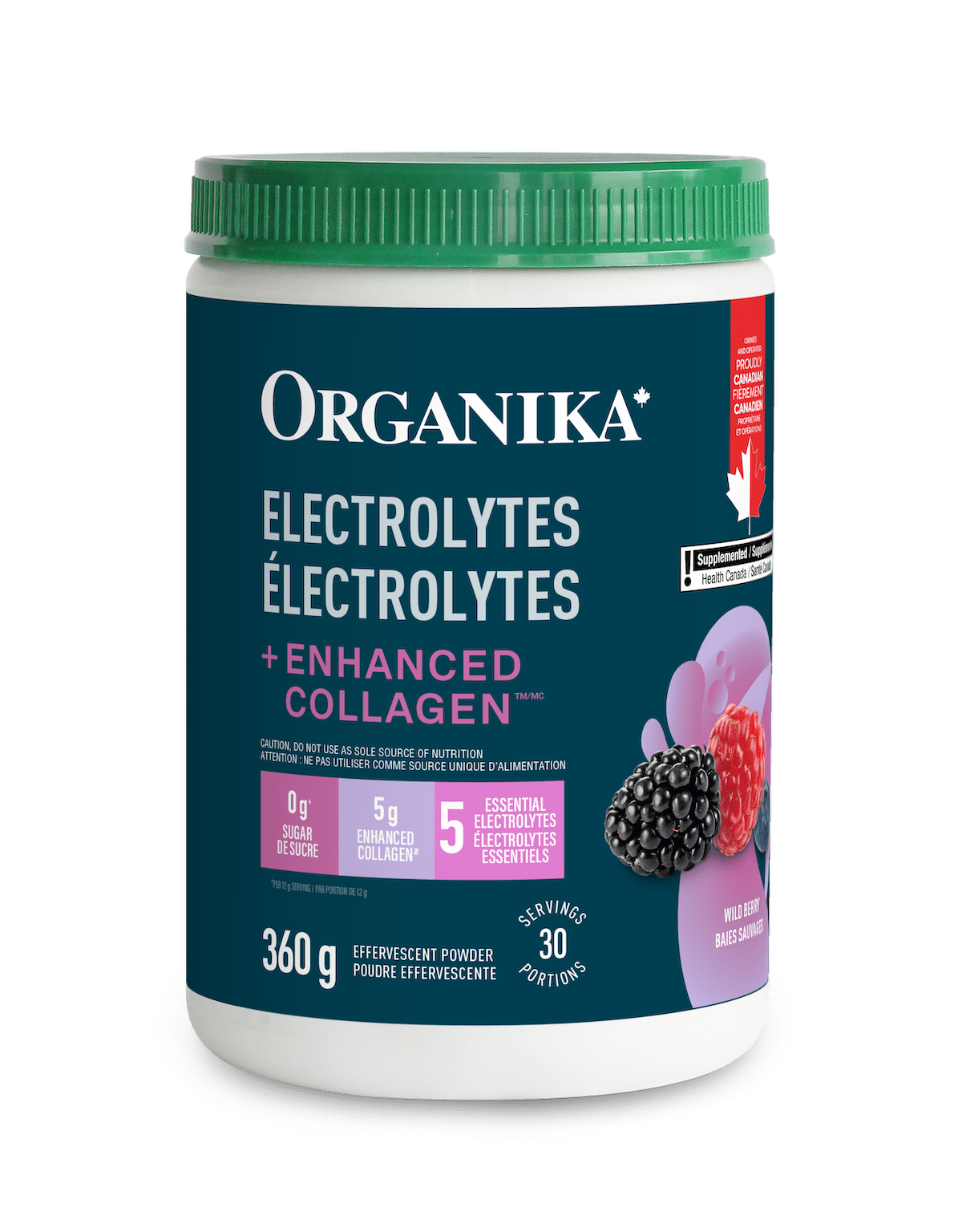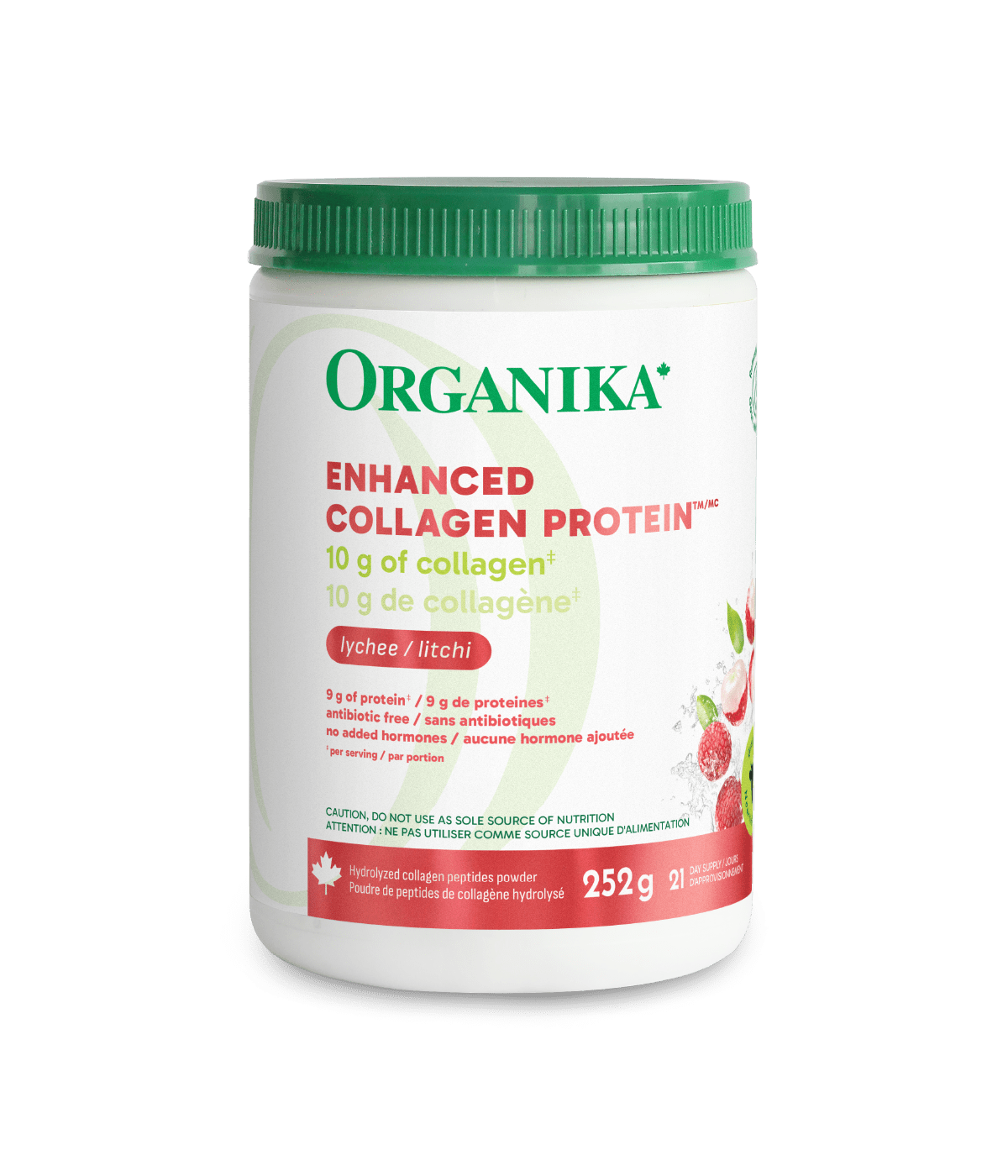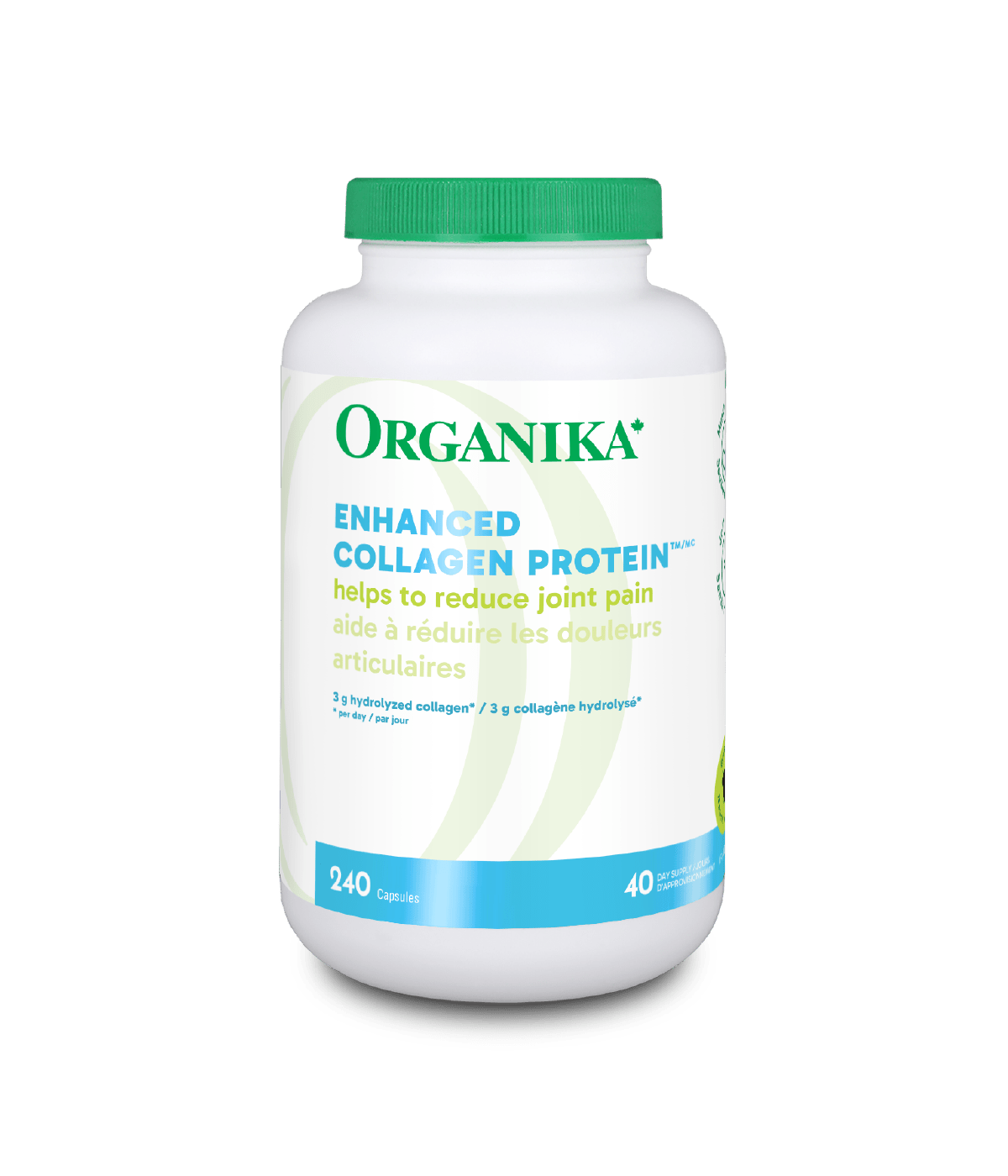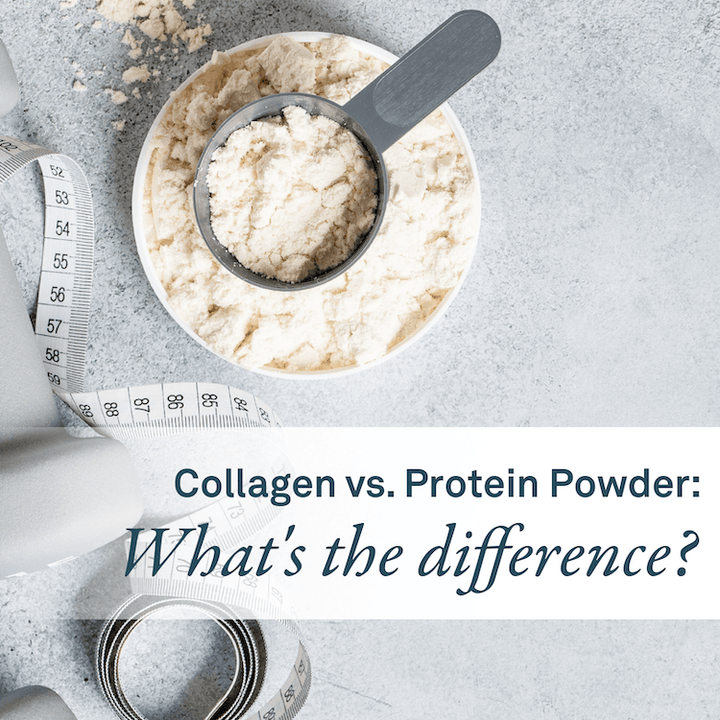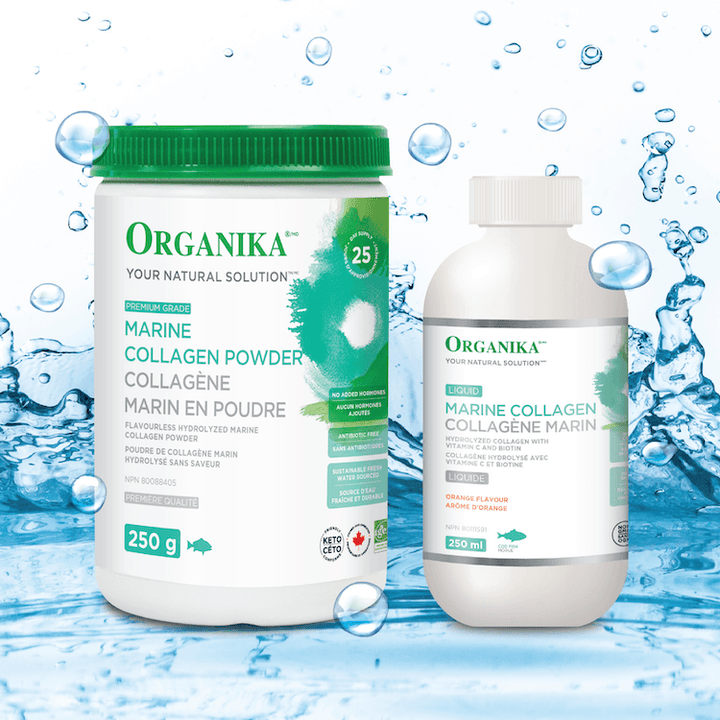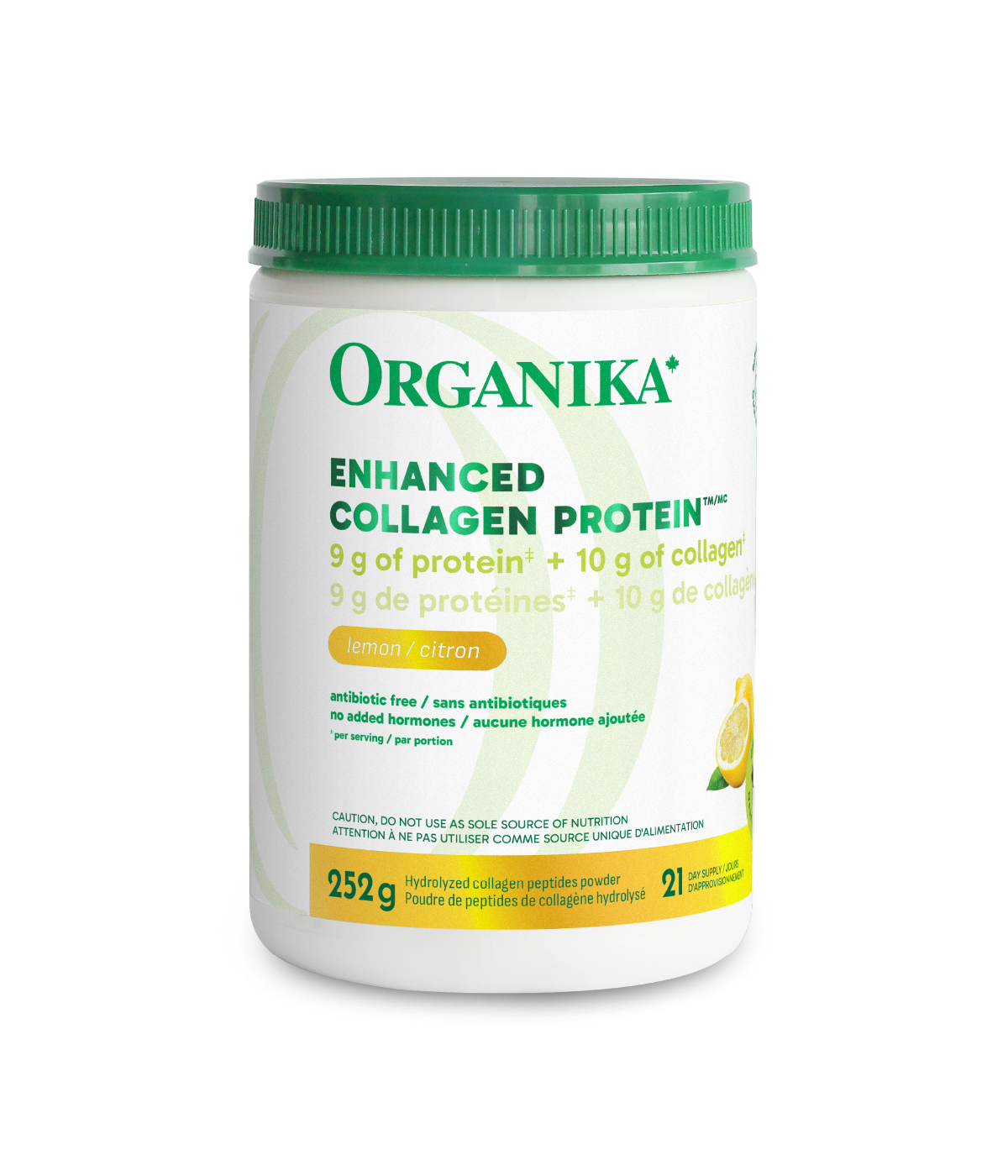
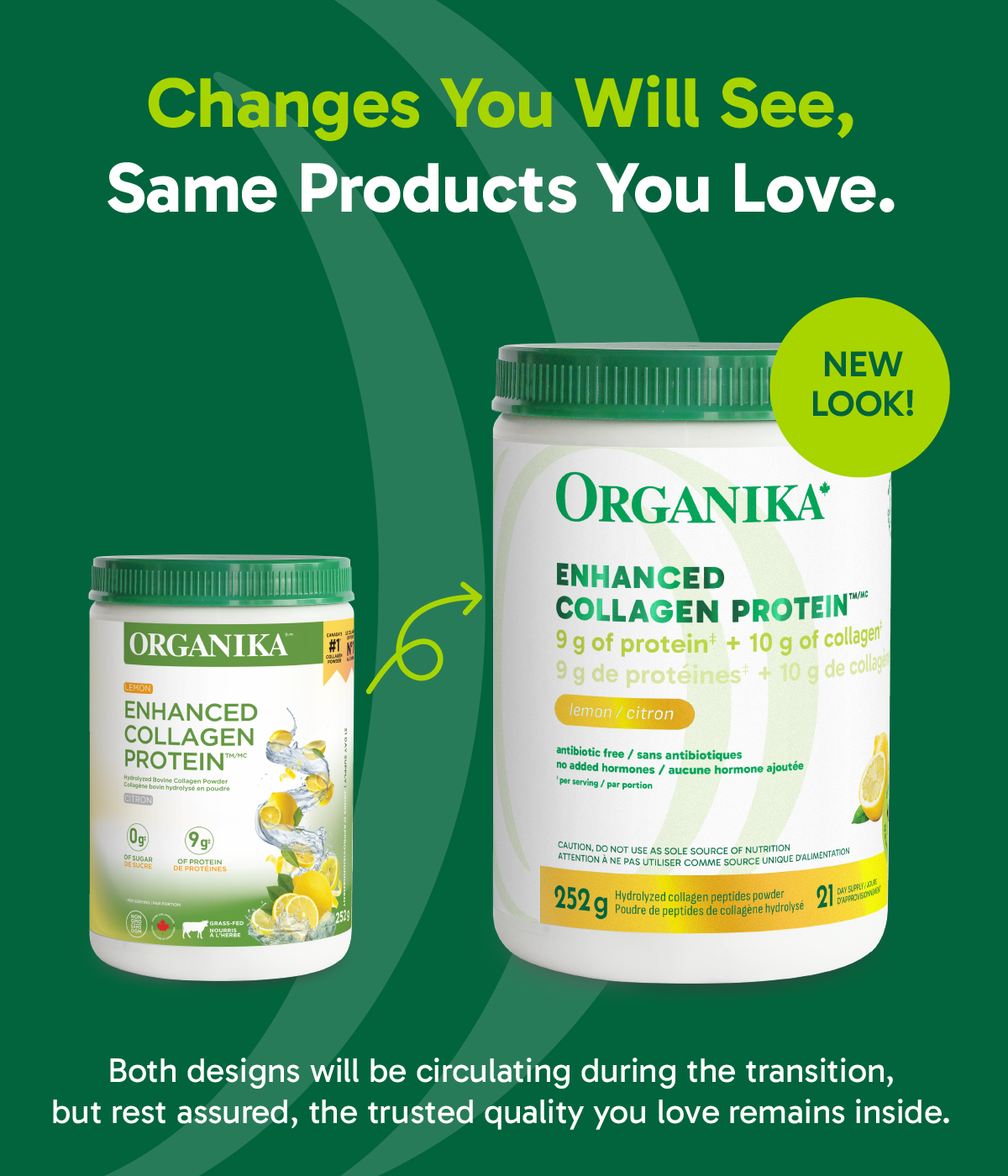
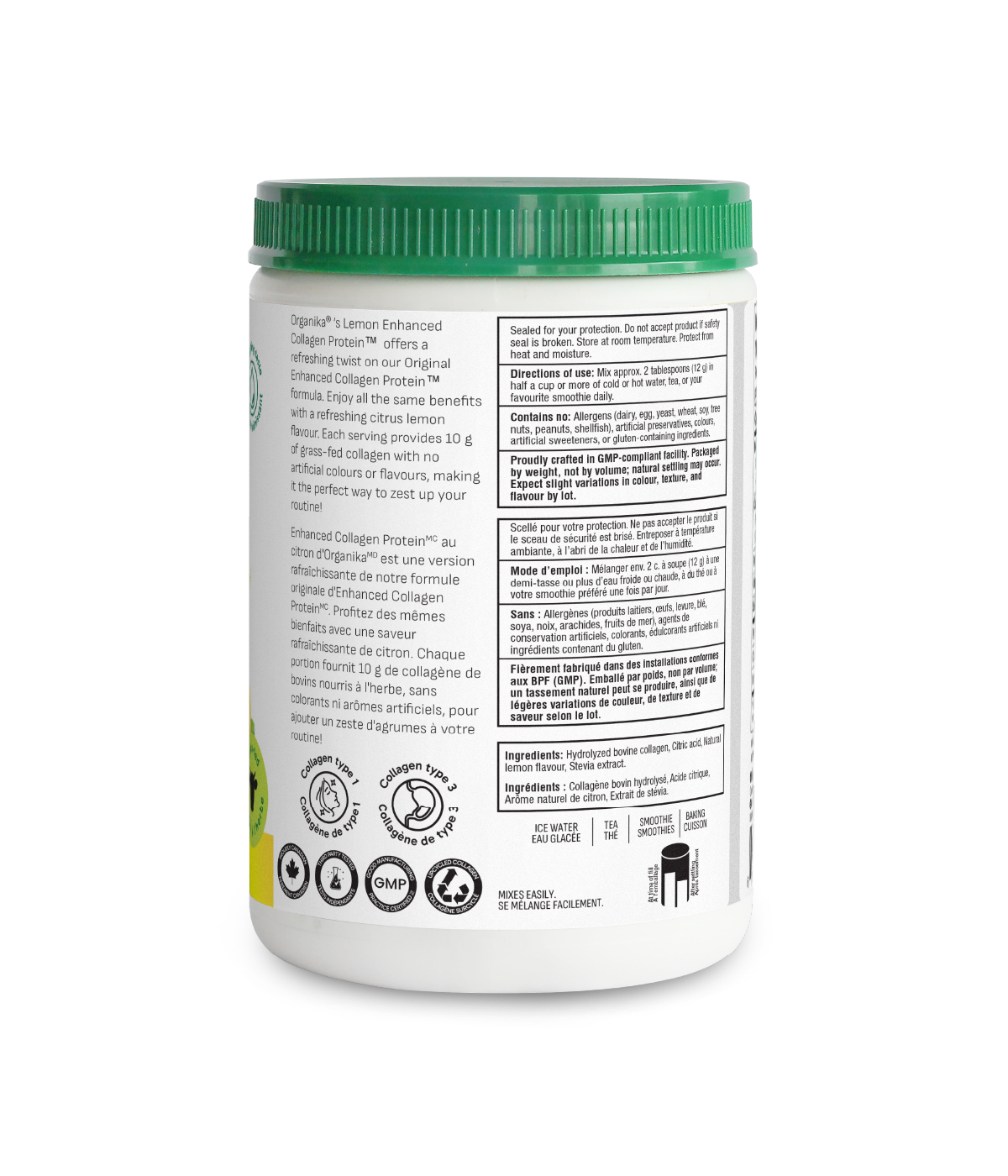
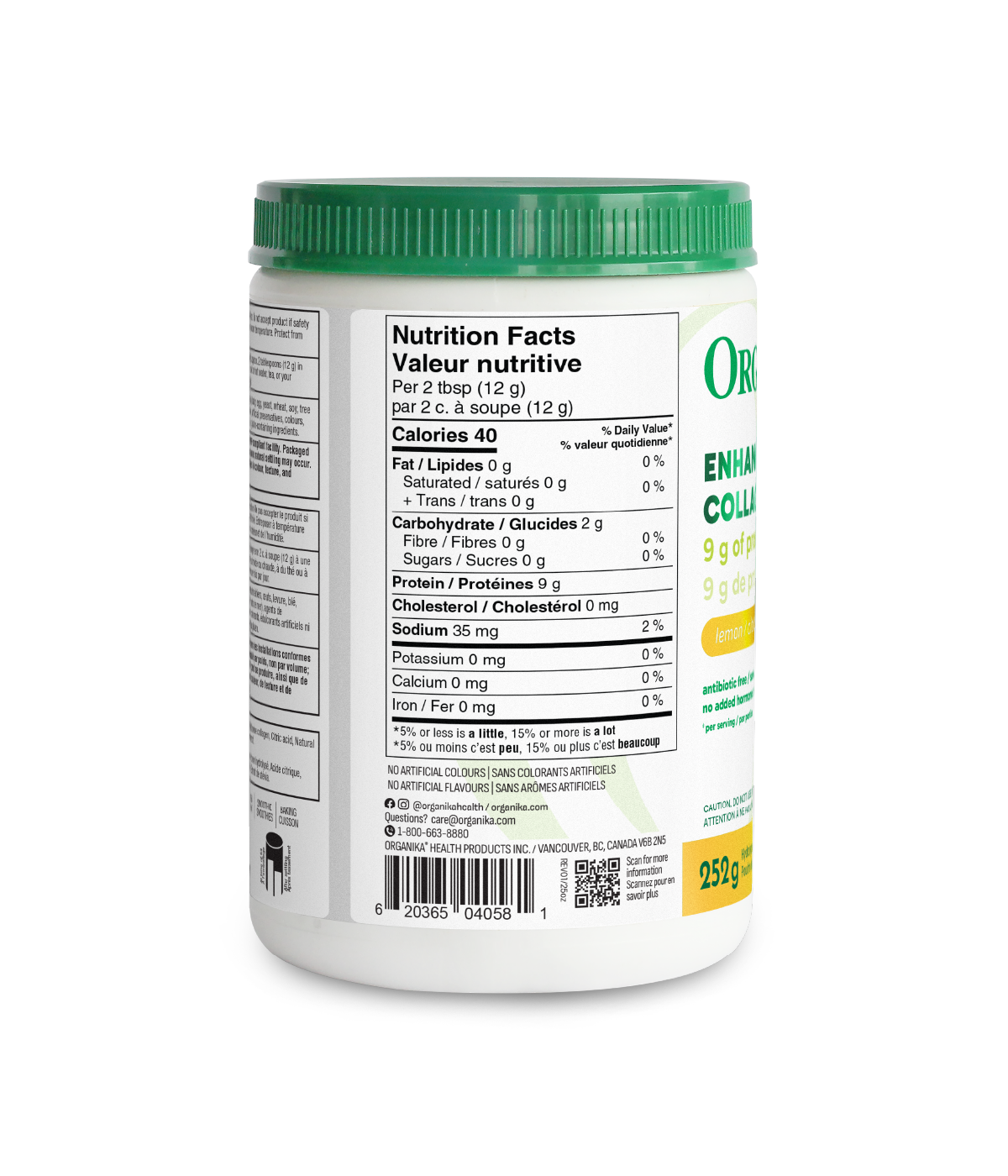




-
Is this right for you?

-


-


-

-

-

Enhanced Collagen Protein Lemon
Lemon flavoured collagen for healthier skin, hair, nails, joints, and gut
- Promotes healthy skin, hair, and nails
- Helps reduce joint pain linked to osteoarthritis
- Supports bone density and healthy digestive linings
- 9 g protein per serving
Impossible de charger la disponibilité du service de retrait



Notify Me When Available
Enter your email and we'll let you know as soon as this product is back
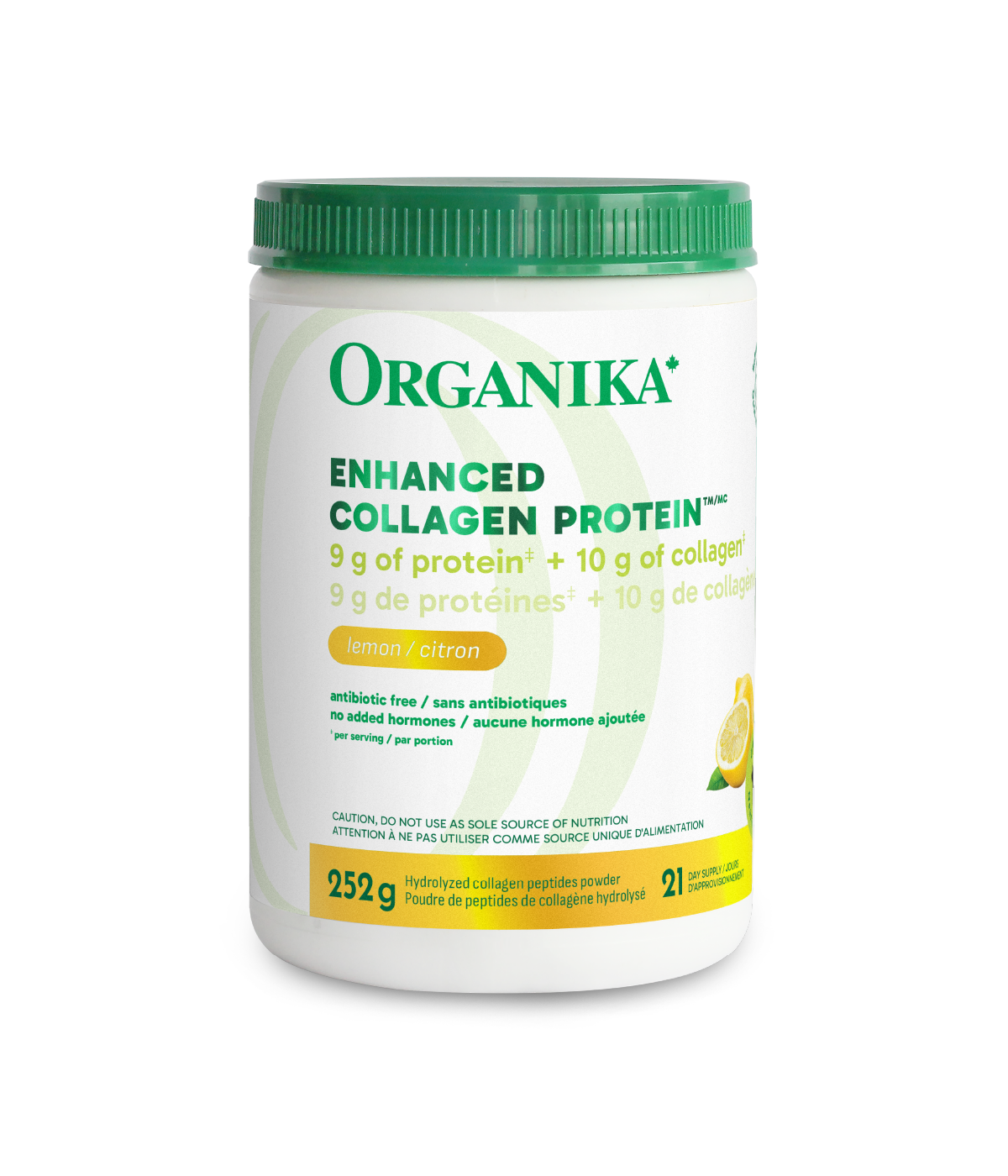
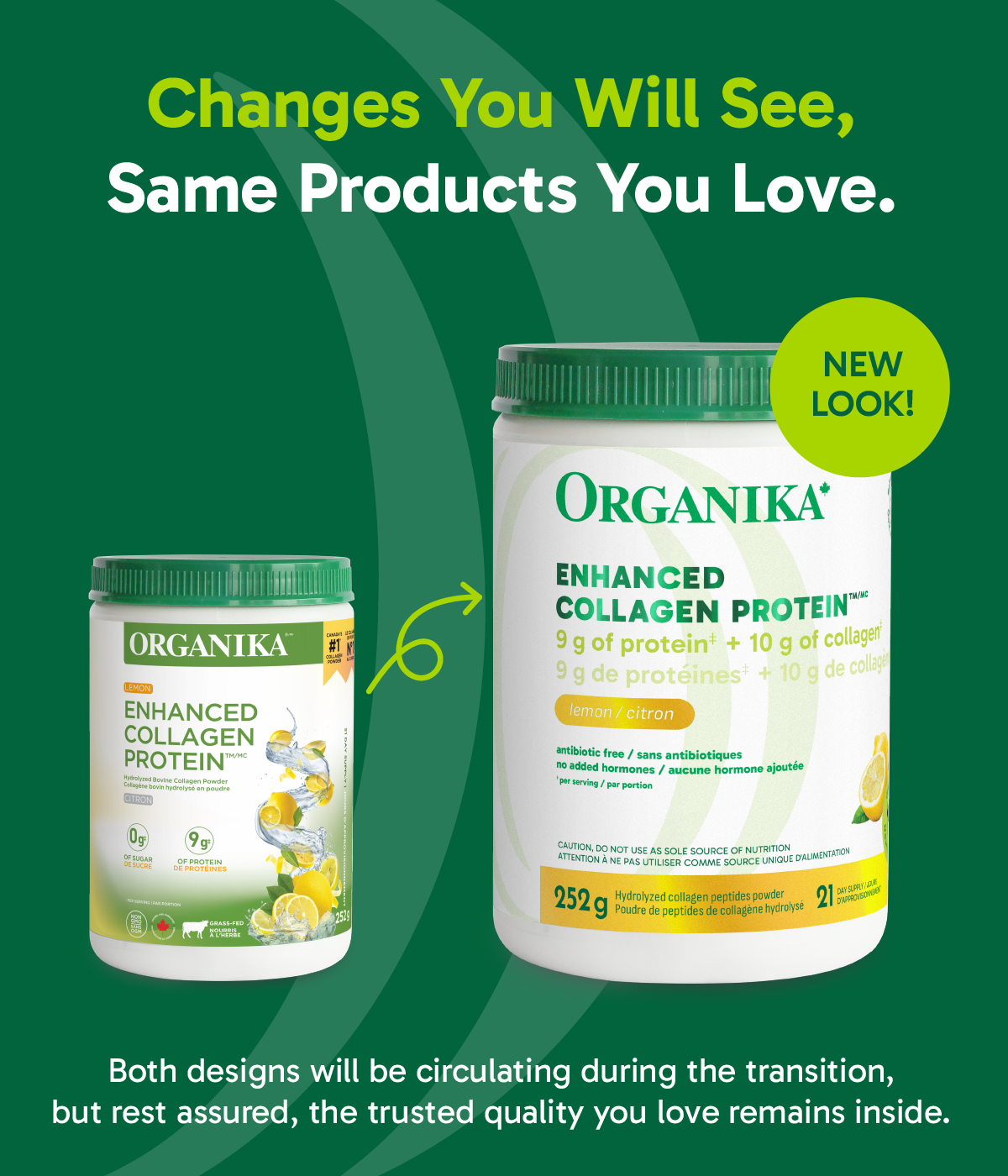
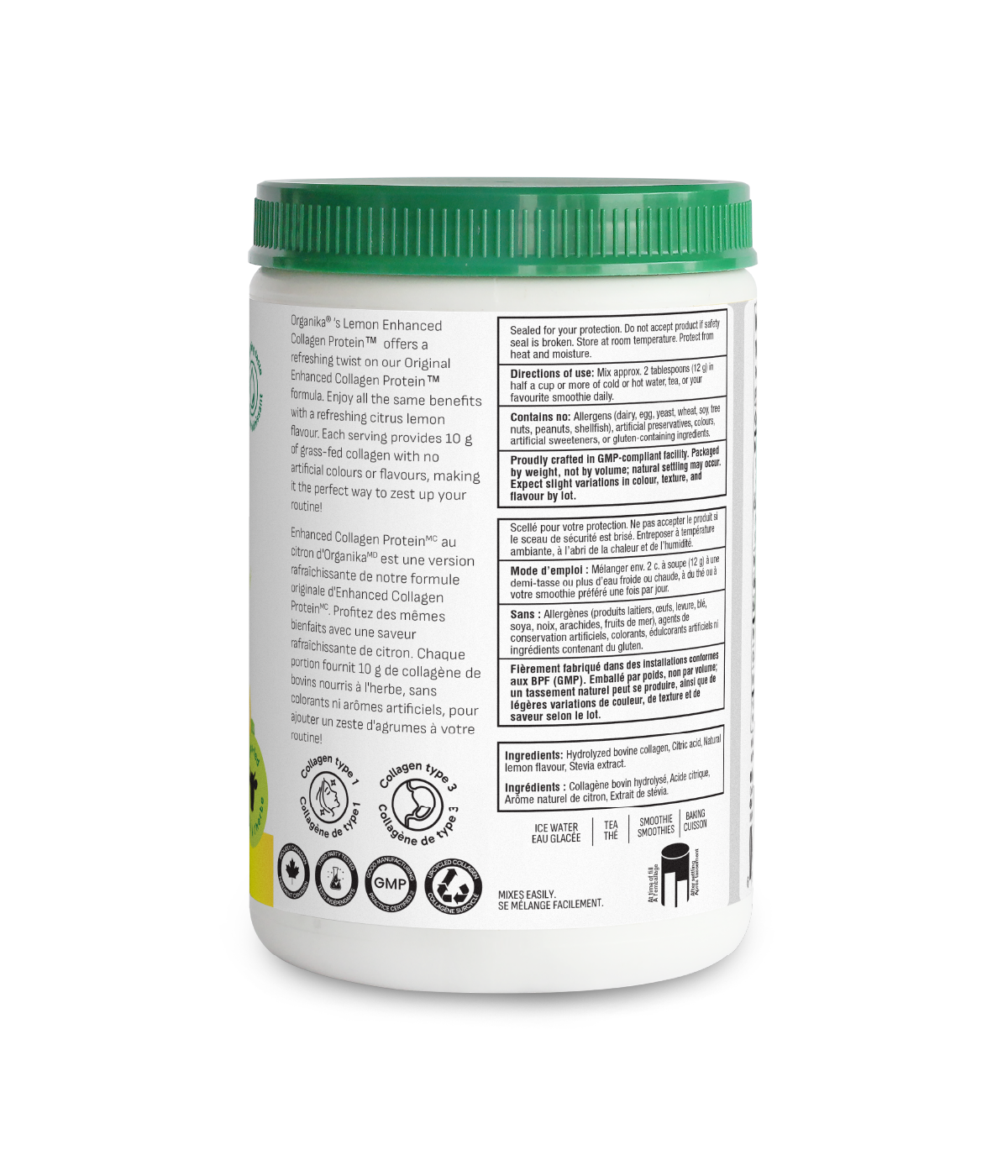
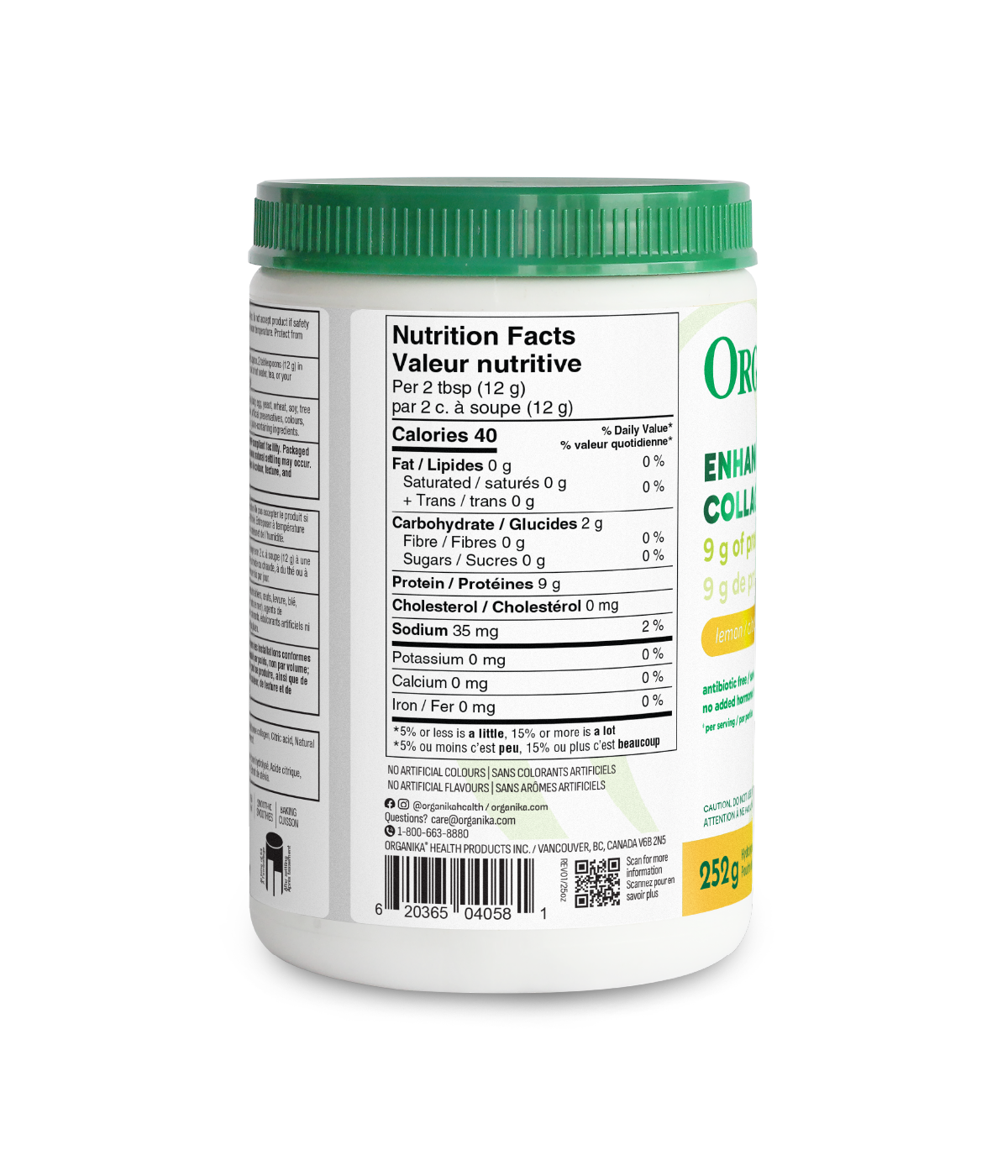




Supplement Facts




Ingredients & Nutrition
MEDICAL INGREDIENTS: Hydrolyzed bovine collagen, Citric acid, Natural lemon flavour, Stevia extract. Free from: Added hormones, antibiotics, dairy, egg, artificial preservatives, colours, yeast, artificial sweeteners, wheat, soy, gluten, or GMO ingredients.
RECOMMENDED DOSE - (ORAL) ADULTS (18 YEARS AND OLDER) ONLY: Mix approx. 2 tablespoons (12 g) in half a cup or more of cold or hot water, tea, or your favourite smoothie daily. Enjoy hot or cold, on its own, or in desserts.

Is This Right for You?
Looking for a single-ingredient collagen?
Want support for joints, skin and muscle?
Looking for a collagen tastes great?
Dealing with joint stiffness?
Wishing you had healthier skin?
If you answered "yes" to any of the above, this product is right for you.

-
Helps reduce joint pain linked to osteoarthritis
-
Supports bone density and healthy digestive linings
Ingredients & Nutrition
Recommend For
Looking for a single-ingredient collagen?
Want support for joints, skin and muscle?
Looking for a collagen tastes great?
Dealing with joint stiffness?
Wishing you had healthier skin?
If you answered "yes" to any of the above, this product is right for you.
Soy-Free
Egg-Free
Keto Friendly
No Preservatives
Non-GMO
Dairy-Free
A delicious collagen powder that supports joint comfort, skin health and protein synthesis without added fillers


The Full Scoop

-
Helps reduce joint pain linked to osteoarthritis
-
Supports bone density and healthy digestive linings
This lemon flavoured collagen powder supports protein synthesis, skin health and joint function, and is sourced for quality and formulated without additives. Each serving includes 9 g of protein with essential and non-essential amino acids. This includes lysine to support collagen formation, glycine and proline for connective tissue repair and branched-chain aminos to help maintain muscle mass. Taken daily, this collagen helps reduce joint pain associated with osteoarthritis and supports the structure and appearance of healthy skin.
Oh, and did we mention it's made with Canada's #1 Collagen Powder?
Ask Away
We’ve got the FAQs covered. But if you’re still stuck, we’re only a message away.
Get in TouchWhen should I use this product?
There is no specific time when this product should be taken, but we recommend adding it to your daily routine so that you're consuming it consistently. Check out our blog for tips on how to enhance your routine!
How is this different from your other collagen products?
Enhanced Collagen is a bovine-sourced hydrolyzed collagen supplement containing type 1 and type 3 collagen. It provides a variety of health benefits and can be easily incorporated into your daily routine as it is easy to mix into hot or cold drinks, smoothies, and recipes.
Who is this product intended for?
Enhanced Collagen is intended for anyone interested in supplementing their collagen and obtaining the benefits of collagen types 1 and 3, which include supporting hair, nails, skin, joints, and the gut. Due to its high protein content, this product is great for those following a keto diet.
How can I tell if this product is working?
Signs that your collagen levels have increased include: stronger and faster-growing hair and nails, hydrated skin, reduced appearance of wrinkles, and reduced joint pain.
You'll Likely Also Love...
Enhanced Collagen Protein Chocolate
Healthier skin, hair, nails, joints & gut in a chocolatey drink with 0 g sugar
Electrolytes + Enhanced Collagen - Wild Berry
Hydration meets collagen in a deeply thirst-quenching and replenishing drink
Lychee Enhanced Collagen Protein
Lychee flavoured collagen for healthier skin, hair, nails, joints, and gut
Enhanced Collagen Protein Original Capsules
Canada's #1 Collagen Powder in capsule form for healthier skin, hair, nails, joints, and gut
Support Beyond Products
What’s the difference? Which one do I need? The word collagen and protein do go together, but there is sometimes confusion around if they are the same thing.They are indeed different. They both cannot be consumed for the same reason; they serve different purposes. Let’s dive in... Collagen vs. Protein Powder Although collagen is a protein, it is not a complete protein. That means collagen does not have all the nine essential amino acids (the building blocks of protein). Protein powders serve the purpose of being consumed as part of your daily protein intake; therefore, it is a complete protein. Collagen serves a specific function, hence it contains specific amino acids, such as glycine and proline. What does that mean? It means, collagen isn’t consumed for the same purpose as protein powder. It is taken specifically as a function/benefit to replenish the lost collagen in the body. Whereas protein powder counts towards your daily macronutrients. Both are important. Why Use Collagen Powder Collagen is the most abundant protein found in the human body, in fact, there are multiple types of collagen. It is a structural protein that allows your skin to have elasticity, muscles to have buoyancy, joints and connective tissues to have flexibility, hair to have strength. However, as you age the amount of collagen your body produces and has decreases. That is why collagen supplementation is key. You cannot get enough amino acids to make more collagen from the conventional ways of eating protein. This is because collagen resides in ligaments, skin, bones, cartilage, and tendons... which are not consumed regularly. Also, it’s unlikely that you will consume enough glycine, for example, for your body to synthesize new collagen on its own. When to use collagen or protein powder If you are looking to increase your protein intake, build muscle mass, you may want to add protein powders into smoothies or recipes to help you reach your macronutrient goals. However, if you are not in that boat, you may not need to supplement with all the amino acids to rebuild new muscle. If you want to improve your joints, muscle recovery, hair, skin, and nails... then collagen is your best bet. With a protein powder, you get all amino acids to reach protein needs. With collagen, you are supplementing what you've lost so that you can improve and enhance your longevity and feel good from the inside out. And yes... you can use both. Just be sure to manage how much protein you are taking in one day to not exceed your daily maximums. For more questions on your nutritional needs, please contact us at care@organika.com and we would be happy to guide your or put you in touch with an RHN.
read moreWhich format of collagen is best to take? So you know about all the wonderful things collagen does and why you should be taking it. Great! There seems to be a bit of an ongoing debate between powder collagen and liquid. Which reigns supreme? Which is absorbed better and overall better for you? We have taken a deep dive to answer those burning questions for you. But first... A bit about each of the most popular forms of collagen supplements Collagen powder Powder is the common form of collagen supplements; in fact, it is how it exists before it is dissolved into liquids. Collagen powders easily dissolve in both food and drinks. The collagen peptides, when extracted from the animal source, are made into a powder first. They are hydrolyzed for easier consumption and absorbability. TIP: Always look for hydrolyzed collagen peptides when choosing a supplement. Most studies look at usage with collagen powders, it is the form that has been most well studied and reviewed as well. From those studies, it’s been shown that collagen is effective... so we know powder is good in that way. How to use: Dissolve into beverages or foods of choice, blend into smoothies, or use in baking. Best for: Anyone that likes to mix collagen their way. Liquid collagen Pre-made collagen drinks contain dissolved powder plus potentially other ingredients to enhance the flavour. For this reason, liquid forms tend to have less collagen per serving than the powdered form...so to get the same amount as in powder you may need to consume more liquid. Up until now, most liquid options were created from marine collagen. However, Organika has liquid forms of both marine and our award-winning Enhanced Collagen from bovine collagen. How to use: Simply take the collagen drink as suggested. Depending on the product, it may be potent per serving (to be drank whole or taken by tablespoon). Best for: Anyone that prefers the convenience of pre-made liquid Collagen capsules Collagen capsules contain powdered collagen, so they provide the same benefits as the powdered form of collagen. It’s really that simple. How to use: Take as directed with water. Best for: Those that prefer taking supplements by capsule vs. food or drink. Your collagen questions answered Which form is best absorbed, powder or liquid? Any collagen supplements should be hydrolyzed. That means its large proteins have been broken down, to make them digestible and easy to absorb. It also makes collagen powder better able to dissolve into liquids. Since liquid collagen is powder dissolved into something – both are equally as absorbable. Are there added ingredients in one form over another? Liquid versions may have added ingredients, simply because they may include natural flavours to enhance the taste and create a desirable product you would want to consume directly. There are multi-ingredient blends available now. That just means, for your convenience, there is collagen combined with other supplements you may need. For example: Enhanced Collagen Sleep is pure hydrolyzed bovine collagen powder PLUS sleep supplements GABA and Melatonin. Blends are made for supplement taker conveniences. Which form is most effective? Taking collagen is effective as been studied. Both are effective, since both come from powdered supplements; powder is more potent. There are many liquid only collagen brands that push the false claim of higher bioavailability or that liquid is more efficiently absorbed, however there isn’t scientific evidence to support that claim. Most collagen studies use powder to show its effectiveness. The bioavailability is in fact improved by the hydrolyzed process (liquid or powder) not what form is consumed. How much collagen do I need from powder vs. liquid? Powder has more collagen per serving than the liquid forms. For example, if you take 1 tablespoon of the powder it is approx. 5 grams of collagen vs 1 tablespoon of the liquid collagen being approx. 1.5 grams of collagen. Therefore, you have to consume a lot more liquid to get the same amount of collagen from liquid. With powder you can use 1-2 scoops as directed, for liquid you would need to take the serving size X 2 or 3 times a day to get the same amount of collagen. What do the experts say? Many naturopaths agree – that while liquid supplements in general are absorbed faster, there is less collagen per serving, and collagen is not a quick fix medicine. You don’t need the super quick absorption (as you would a cough and cold syrup). Because of its potency and versatility, powder is great. If you prefer liquid, that is fine also. It is really a consumer’s choice. We also asked nutritionists that pointed out that since both the liquid and the powder are from the same hydrolyzed collagen source, they are both bioavailable and absorb well in the body. The collagen for both the liquid and the powder will be absorbed in the gut, so when choosing one over the other they work/absorb the same way. What really matters The form of collagen you take is entirely up to your preference. Collagen powder can give you more collagen per serving than a liquid collagen shot, but sometimes grabbing pre-made collagen water is more convenient. The most important thing when looking for a collagen supplement is the source/type and quality of the collagen. Learn more about collagen types here. REFERENCES: https://pubmed.ncbi.nlm.nih.gov/33742704/ de Miranda RB, Weimer P, Rossi RC. Effects of hydrolyzed collagen supplementation on skin aging: a systematic review and meta-analysis. Int J Dermatol. 2021 Dec;60(12):1449-1461. https://pubmed.ncbi.nlm.nih.gov/31411379/ Jhawar N, Wang JV, Saedi N. Oral collagen supplementation for skin aging: A fad or the future? J Cosmet Dermatol. 2020 Apr;19(4):910-912.
read moreDo I need to take collagen? Collagen is the most abundant protein in the body. It’s made naturally in the body. It’s also the protein that gets produced less as we age.In fact by the time we reach the age of 25, the amount of collagen our body produces starts to decline. Yikes!As a result, many are turning to supplementation. Do you need it? What is it good for? What Is Collagen? Collagen is naturally found in the body and is a protein with many functions. It’s the main component in your connective tissues, muscles, tendons, ligaments, joints and skin.Collagen can be thought of as the “glue” that helps hold the body together. It's responsible for keeping your skin firm and elastic, your joints strong and stable, and your digestive system healthy and working.It’s a hard-working protein that your body has a limited supply of.If you are thinking about taking collagen as a supplement, there are several benefits. 6 benefits to taking collagen 1. Supports Healthy Gut You may have heard that a healthy gut is the key to overall health. It’s true. Building a stronger intestinal lining, preventing its breakdown or weakening, and protecting it from unwanted bacteria is the goal. When the digestive tract is weakened, it can lead to pain and discomfort but also “leaky gut.” Leaky gut (where bacteria flow into the bloodstream from the gut) can cause fatigue, allergies, poor immunity, and more.Collagen can help. Loaded with the amino acid glutamine, it's been proven to be effective in preventing leaky gut and the subsequent chronic inflammation that can wreak havoc on the body.[1] 2. Improves Skin Quality Since collagen is the structure that helps with skin elasticity, it makes sense that as the body loses it, skin quality goes down. However, diet can help influence skin health. Diets high in sugar and processed carbohydrates cause our bodies to produce advanced glycated end products (AGEs), which reduce the density of collagen fibrils, leading to wrinkles and aging skin quality. Chronic sun exposure also further damages collagen fibers.To counteract that, consuming collagen peptides may help. Supplemental collagen has been shown to reduce the harmful UV-B induced skin damage to support superior skin quality.[2] Taking collagen supplements orally has been shown to increase skin elasticity, hydration and density of the skin.[3][4] Collagen supplementation is generally safe with no reported adverse events. [3] 3. Fights Joint Pain The building blocks of healthy joints come from your diet. These include key amino acids like proline, lysine, and glutamine, which support the natural production of collagen in the body. Recent studies show improvement in pain and physical function after supplementation with hydrolyzed collagen peptides.[5] Consuming enough quality protein and digestible collagen can really support the joints long-term. Chronic pain and arthritis are two of the most common reasons for patient visits to the doctor. The solutions often prescribed from those visits are ointments and drugs that help ease the pain, but do not address the root of the problem. The building blocks of healthy joints come from your diet. These include key amino acids like proline, lysine, and glutamine, which support the natural production of collagen in the body. Recent studies show improvement in pain and physical function after supplementation with hydrolyzed collagen (see Figure 1.0)[3]. Ensuring you eat enough quality protein or easily digestible supplemental collagen is fundamental to healthy joints in the long run. 4. Supports Weight Loss Collagen supports weight loss in a unique way. It’s not thermogenic or stimulant, like most weight loss supplements, but rather it impacts your satiety levels by naturally inhibiting the main hormone in the gut that triggers hunger [6]. What that means is that consuming collagen peptides can keep you from craving mid-afternoon sugar-laden snacks and unnecessary snacking. Adding collagen to your mid-morning coffee or mid-afternoon tea can be a great strategy to curb cravings and make it through to your next meal. 5. Improves Athletic Recovery If you’re active, training intensely, or always on-the-go, then your joints are likely suffering from some wear and tear. You will want to do some form of muscle recovery after high performance. It’s been found that taking collagen 1-hour before exercise or rehab activity increases the uptake of collagen into your joints, which accelerates recovery. [7] Unlike muscles, which can soak up nutrients for hours after activity, your joints suck up the surrounding water and nutrients within the hour after exercise, making the timing of your collagen intake crucial for supporting joints. Tip: Add a little vitamin C from lemon juice or a fruit snack to further increase absorption. 6. Supports Deep Sleep It seems more than ever; people are craving a restful sleep. Interestingly, studies have shown how collagen can help support the deep sleep your body longs for. Collagen contains the amino acid glycine. Glycine helps your body decompress and unwind, and is needed for quality sleep. Quality sleep helps to keep energy levels up, give your body strength to fight off viruses and infections, and thrive in your daily life. [8] I need to take collagen, how do I add it to my diet? The easiest and simplest way to consume collagen is through supplementation. In fact, that’s how many of the studies on collagen were done. For digestibility, hydrolyzed collagen peptides are a great solution.A high-quality collagen supplement, such as Organika’s Enhanced Collagen is ideal. Voted Canada’s #1 collagen powder, it’s made with bovine collagen and is beneficial for bones, joints, gut, hair, skin and nails.Check out the full Enhanced Collagen line up! There are many variations of collagen supplements, however, depending on what you prefer or your lifestyle, one may work better than another. You can get collagen in powder, capsule, and liquid form.You may enjoy adding collagen in powder form to your beverages or smoothies. You can even mix it into your yogurt or add it to baked goods.Maybe you prefer taking your collagen in liquid form, easily adding it to water or juice.Want to try collagen but you're vegetarian? We have a Vegetarian Collagen in easy to take capsules. The options are endless and the benefits are so worth diving into! Incorporate more collagen into your diet and feel the difference for yourself. References 1. Rao, R. Samak, G. Role of Glutamine in Protection of Intestinal Epithelial Tight Junctions/ J Eptihel Biol Pharmacol. 2012 Jan: 5(Suppl 1-M7):47-54. 2. Tanaka, M et al. Effects of Collagen Peptide Ingestion on UV-B-Induced Skin Damage. Biosci. Biotechnol. Biochem, 73 (4), 930–932, 2009. 3. Choi FD, Sung CT, Juhasz ML, Mesinkovsk NA. Oral Collagen Supplementation: A Systematic Review of Dermatological Applications. J Drugs Dermatol. 2019 Jan 1;18(1):9-16. 4. de Miranda RB, Weimer P, Rossi RC. Effects of hydrolyzed collagen supplementation on skin aging: a systematic review and meta-analysis. Int J Dermatol. 2021 Dec;60(12):1449-1461. 5. Bello A, Oesser S. Collagen hydrolysate for the treatment of osteoarthritis and other joint disorders: a review of the literature. CMRO. Vol 22, 2006 – Iss 11. 6. Halden G, et al. Evidence for a Role of the Gut Hormone PYY in the Regulation of Intestinal Fatty Acid-binding Protein Transcripts in Differentiated Subpopulations of Intestinal Epithelial Cell Hybrids. J Biol Chemistry. Vol. 272, 1997. No. 19, Issue of May 9, pp. 12591–12600. 7. Hagarty, P et al. The effect of growth factors on both collagen synthesis and tensile strength of engineered human ligaments. Biomaterials 2012. doi:10.1016/j.biomaterials.2012.05.045. 8. Yamadera, W et al. Glycine ingestion improves subjective sleep quality in human volunteers, correlating with polysomnographic changes. Sleep & Biological Rhythms. Vol 5, Iss 2, April 2007, pg 126–131. Check out Organika®'s collection of collagen products
read more





